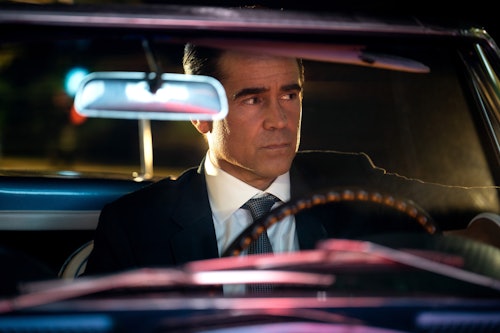
Like any good detective, Apple TV+’s Sugar keeps things close to the chest. But unlike any other good detective show, Sugar gets so wrapped up in its own mysteries that it forgets how to be engaging TV.
A genre-bending noir from I Am Legend scribe Mark Protosevich, Sugar has a lot of intriguing elements going for it. It’s got star Colin Farrell, who also executive produces the series. It’s directed by Fernando Meirelles, the Oscar-nominated filmmaker behind City of God. And it’s executive produced by Simon Kinberg, whose fingerprints can be found all over sci-fi hits like Legion and The Martian (but also directed arguably the worst X-Men movie ever: Dark Phoenix). Sugar has all the makings of a great genre show, one that could cleverly play with its noir tropes in exciting and unconventional ways. Unfortunately, none of its most promising elements come together, and Sugar ends up an incoherent jumble of half-formed ideas.

Farrell stars in Sugar as the titular private investigator John Sugar, the rare PI with a heart of gold. Sugar abhors guns, and will frequently stop to dole out random acts of kindness — helping a struggling homeless man find shelter, offering a free doctor’s appointment to his ailing cab driver, taking in stray dogs, etc. But his seedy profession seems to be getting to him, so much so that his righthand woman Ruby (a warm, but enigmatic Kirby) warns him against taking on his latest case: a personal assignment from film-producing legend Jonathan Siegel (James Cromwell), who hires Sugar to find his missing granddaughter, 25-year-old Olivia (Sydney Chandler). The rest of the dysfunctional Siegel family — including Olivia’s self-centered film producer father (Dennis Boutsikaris) and spoiled actor brother (Nate Corddry) — brush off her disappearance as that of a recovering junkie who probably slipped back into bad habits, but Sugar discovers that there’s something more sinister at work. And it may or may not be connected with his own troubled past.
There’s one thing that Sugar has going for it right from the start: an incredibly game Colin Farrell, who throws himself into the role of John Sugar with a guileless sincerity that sells us on the good-hearted detective. There’s a bit of nerdiness to his performance that helps this noir send-up go down smoothly. Sugar, it’s quickly revealed, is a huge cinephile who loves nothing more than to moon over Jonathan Siegel’s great contributions to cinema.
When Sugar’s love for movies starts to bleed into the show itself, things really get interesting. Sugar will frequently cut to scenes from classic movies, often ones its protagonist knowingly references while investigating his case. Other times, they’re built into the fabric of the shot itself — a drain that starts to circle and fades into an eye, in a clear homage to Psycho, for example. Sometimes, these flashes to classic films are so fast they’re almost subliminal, making one wonder whether Sugar’s love for movies is starting to disintegrate his grip on reality. It’s a fascinating twist on the classic hardboiled noir, which Sugar mostly plays as a moody, grim atmosphere completely with grizzled narration and femme fatales galore.

Sugar is at its best when it appears to be a genre-heavy riff on Jean-Luc Godard’s Breathless, which, in its story of a petty criminal who fancied himself Humphrey Bogart, created a profoundly experimental piece of cinema through its dialogue with classic Hollywood films. But unlike the 1960 French New Wave classic, Sugar doesn’t have the capability to do anything much with its movie homages. Its cinematography is oddly pedestrian, with Meirelles relying heavily on handheld cameras and natural lighting — choices that don’t fit comfortably with the noir structure of the show. Once the novelty of its hardboiled detective riff starts to fade, Sugar quickly falls apart.
To explain why Sugar doesn’t quite work would be to breach the lengthy list of spoiler items that critics were banned from mentioning in our reviews of the eight-episode series. But the same apprehension with which the Apple TV+ series treats these spoiler elements speaks to the way Sugar doesn’t seem to trust itself to stand on its own. The series is far too cautious in revealing what it’s really about, and by the time the twists are unveiled, it’s too late for the audience to care. It’s the most frustrating form of the mystery box: a show that believes its mysteries are more interesting than they are.
Sugar leans on genre riffs and the charisma of its star, as much as it leans on twists built on top of twists. But once that’s all peeled away, Sugar is underwhelming and awkward, leaving you perplexed, and a little irate, that Farrell’s talents were wasted on this.
Sugar premieres on Apple TV+ on April 5.
FTTT
0 Comments